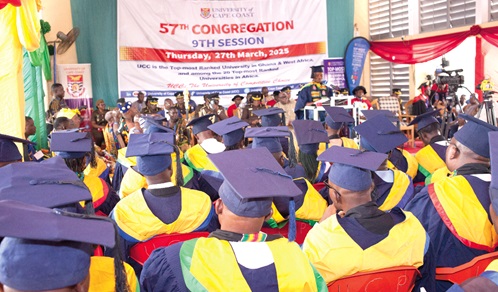Sixty-three (63) prisoners in the Nsawam Medium Security Prison have completed studies in various disciplines under the Prison Inmates Tertiary Education Programme (PITEP).
The inmates are now recognized graduates of the University of Cape Coast (UCC).
The graduates received degrees, including a Bachelor’s degree in Commerce (Accounting and Management options) and a Bachelor’s degree in Education (Junior High School Education) and were awarded certificates through UCC’s College of Distance Education (CoDE).
The ceremony, held at the Nsawam Prison precinct, marked the ninth session of the university’s 57th congregation, but the maiden graduation under PITEP.
PITEP, an initiative of the non-governmental organisation (NGO) Plan Volta Foundation, provides incarcerated individuals with free access to higher education, enabling them to pursue university degrees while serving their sentences.
Implemented in partnership with the Ghana Prisons Service, the programme aims to rehabilitate inmates by equipping them with academic and professional skills, increasing their chances of reintegration into society upon release.
The Best Student of the graduating class, Matthew Milluzieh, stated that their successful completion of a degree programme was not merely about acquiring knowledge and skills but also a positive experience that enabled them to critically examine their past actions and understand the consequences of their choices.
“We entered these walls not as students but as individuals to be reformed. Today, we are not just degree graduates but renewed and ambitious individuals who will prove wrong society’s perception that once an inmate, always a criminal,” he said.
Mr Milluzieh is currently serving a 20-year prison sentence since 2018.
Two other inmates were also awarded special scholarships to further their education in recognition of their exemplary academic performance during their studies.
The ceremony also saw the presentation of plaques of honour and citations to various stakeholders for their outstanding contributions to the success of the programme.
Additionally, individuals and organisations that have consistently supported the welfare and rehabilitation of inmates were recognised for their efforts.
Testament

